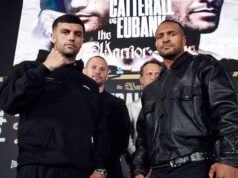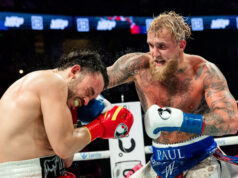Katsidis Took Care of Business Against Mitchell, Possibly Avoiding Hometown Controversy
In bludgeoning Dagenham prospect Kevin Mitchell to defeat in three rounds on Saturday, Australian WBO interim champion Michael Katsidis could have avoided what would have been the latest in a small but significant line of easily avoidable boxing controversies. Katdisis had 24 hours earlier requested London referee Dave Parris be replaced by a neutral arbiter.
While in most other major sports it has become mandatory to have a referee from a neutral venue for any international fixture, for some inexplicable reason this is not the case in boxing.
As it was Katsidis needn’t have worried about a London-based referee favoring the house fighter, and obviously even if the fight had gone to the scorecards the result would have hung in the hands of three neutral judges, not the referee.
But there is definitely a precedent in which referees have been deemed to influence results inadvertently in recent years which raises concern that Katsidis’s understandable request was denied.
In October of 2008, Montreal-based referee Marlon B.Wright was criticised for giving fellow Montreal-resident Lucian Bute more than 20 seconds to recover from a last ditch 12th-round knockdown in which he appeared on unsteady legs.
By repeatedly reprimanding Andrade for ‘failing’ to enter the neutral corner – Andrade had actually appeared to move to the correct corner – he allowed the house fighter far longer to get to his feet than he should have had.
Bute was then able to see out the final seconds of the fight without having to take any more punishment. There was even an argument for stopping the fight with Bute apparently in no condition to fight on had it been required, but Wright opted against it.
Similarly, although far less clear cut, was Ricky Hatton’s defeat to Floyd Mayweather in December 2007. In that fight, American referee Joe Cortez seemed hell bent on preventing the Hitman working inside and split the fighters at every opportunity even when neither man had been tied up.
He then docked Hatton a point in the sixth round for a wild swing at the back of Floyd’s head as the American turned away, which did not even land. The resultant frustration saw Hatton throw caution to the wind and he was picked off and stopped in 10 by an admittedly brilliant Mayweather.
In both cases, and certainly the latter one, I am not suggesting that the result WOULD have been different were it not for the questionable actions of the officials, nor am I casting aspersions about their integrity. But in both cases the referee’s actions appeared to favor the house fighter and COULD have had some kind of influence on the results.
We will never know if this is the case or not of course, and Bute’s subsequent knockout of Andrade in a rematch last year left us in no doubt that the better overall fighter did indeed win their first encounter. But in both cases couldn’t any suggestion of partiality by the referee have been easily avoided by simply applying common sense and appointing an official from a neutral country, or at the very least a neutral country?
It would like to add that I in no way believed Parris would have acted in any way to influence the contest in favour of the local boy. I am merely questioning the policy of not using neutral referees for major fights. It is idiosyncrasies such as this, when compared to other sports, which often leave the noble art open to ridicule by practitioners of other more rigorously regulated sports.
With no overall global governing body, a plethora of champions, super champions, champions in recess and interim belt holders at each weight not to mention the sport’s questionable drug-testing practices, boxing sadly does not need any help discrediting itself.
The practice of having a referee from the same country or same town or city as one of the competitors is simply not tolerated in international football (soccer) or Rugby, for example, and it’s for the exact reason that, whether deliberately or not, it could hand one team an unfair advantage. Isn’t it time boxing caught up?










